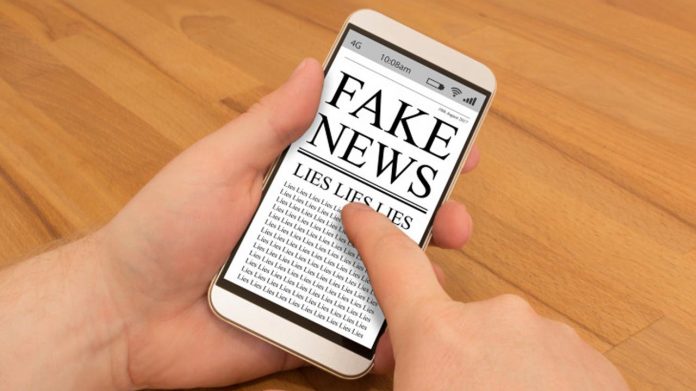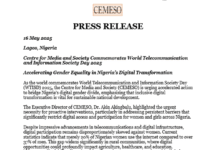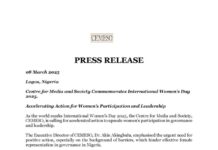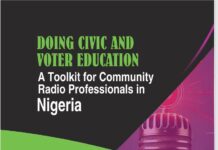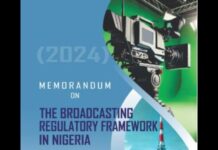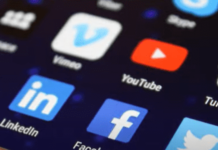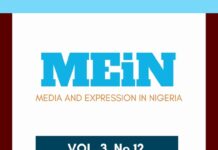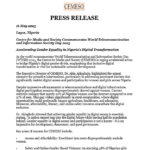The Acting Chairman of Broadcasting Organization of Nigeria, BON, Mr. Godfrey Ohuabunwa has urged government at all levels to avail the Nigerian media, especially the broadcasting media with all the necessary information they required to achieve responsible broadcasting in the country.
Ohuabunwa made the call on Tuesday in Abuja at the 5th Annual Lecture of The National Broadcasting Commission themed: New Media Convergence and the Future of Broadcasting: Greedy Telco, Broadcasters and the Scramble for Spectrum. The BON Acting Chairman said if the media must join hands with government to fight fake news and build a united country, the government must grant access to the local broadcasters for them to meet the challenges of Nigeria and help to build an integrated country.
He said that fake news remains a problem to contemporary Nigeria but for the broadcasters to help government fight the spread of fake news, they must have unfettered access to information to deter them from speculation from foreign media, ‘and that way, if government made themselves available to broadcasters, issue of fake news will be reduced.’ He argued that where the broadcasters do not have access to information, but CNN has access and we begin to rely on foreign media to have access, fake news will subsist.
His words: The theme for the NBC inaugural lecture is apt with the challenge of contemporary broadcasting in Nigeria. Two things came out of it, it looked at the problem of a nation, Nigeria and also looked at the challenge involved in the united and integrated nation. He looked at broadcasting in the contemporary world. I see that as commendable, especially now Nigeria is facing a lot of challenges. ‘‘If we must have a united country, if the broadcasters have to be responsible, and meet the challenge of Nigeria and help to build an integrated country, two things go will happen. ‘‘One is that fake news is a problem but for the broadcasters to help they must have access to information, that way, if government made themselves available to broadcasters, issue of fake news will be reduced. Where the broadcasters do not have access, but CNN has access and we begin to rely on people to have access.’’
Ohuabunwa, who also blamed the current threats to the unity of the country on ethnicity, state of origin in registration, employment and promotion and also on religion, called for the removal of the divisive tendencies in order to move the country forward as a united entity. ‘‘The issue of ethnicity and breaking up the country in terms of spreading wrong and volatile information, I think one of the things we can do as a country is to: remove religion, ethnicity, remove state of origin in our registration, it should be a condition for employment, it should not be a condition for promotion, or for election. If we take those things out, the Igbo Boy is a Hausa boy, the guy who lives in Kano does not care where he comes from.
‘‘These are things that will help the broadcasters tell a good story. There is a challenge in the country and the broadcasters’ job is, to tell the truth. I believe, there are irresponsible broadcasters, and the role of the NBC is to regulate the industry. Though NBC has been doing well, they have to change. How do we regulate new media? There is a challenge in the whole ecosystem. So, the method regulation is done should also change. NBC should meet up with the new media. And the way to do it is different,’’ he explained.
Earlier in his address, the Director-General of NBC, Is’haq Modibbo Kawu said the annual lecture was established in 2015 by the Commission to mark its anniversaries and to bring together stakeholders within and outside the broadcasting industry for meaningful, mutually beneficial, intellectual interaction. This effort by the Commission, he said had contributed very meaningfully to a broad-based discourse on pressing national issues, which our broadcasters interrogate and further exploit through professional packaging of programs for the benefit of the Nigerian audiences. ‘‘The positive impact of this lecture series is quite apparent, with broadcast content now being increasingly packaged to address issues of national development as well as that of the broadcast industry’’ He expressed optimism that the future of the industry will be bright as the Commission’s focus, presently is the Digital Switch Over (DSO), with plans underway by the Commission to achieve the DSO roll-out in all States of the country.
R


